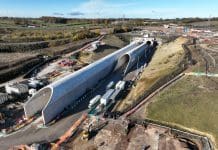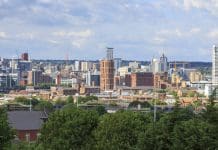HS2 has revised designs for the railway in the Canley Brook area in Warwickshire to reduce the environmental impacts and avoid a major realignment of a local river
There are also plans for improved integrated landscape design.
The design changes, developed by HS2’s main works contractor Balfour Beatty Vinci (BBV) with their design JV partners, mean that the railway will travel in a slightly shallower and longer cutting in this area.
A viaduct can be built over Canley Brook, so it will only need a small 80-metre diversion rather than the 700 metres in the original design.
This will lead to significantly reduced environmental impacts, including around 600,000 cubic metres less material needing to be excavated and 28,000 cubic metres less concrete needed as a result of removing the retaining wall for the Canley Brook realignment.
Less excavation and building work will also cut the amount of construction traffic on local roads, removing over 2,500 lorry movements, reducing noise and disruption for the local community.
Replacement of two kilometres of retaining walls with cutting slopes will also reduce the ‘barrier effect’ of the scheme for species and provide additional opportunities for new habitats and grassland for newts and reptiles.
More vegetation will be preserved and the overall amount of land required will be reduced, meaning more land can be returned to agricultural use after construction.
There are plans to create a high-quality wetland habitat either side of the realigned section of Canley Brook, as well as additional woodland, hedgerow and species-rich grassland habitat on both sides of Crackley Road Cutting.
This will benefit a range of protected and local species and contribute to HS2’s objective of achieving no net loss of biodiversity.
A solution to benefit communities
Grant Sharman, landscape architect from the design JV, said: “An important part of the design approach is collaboration between engineering and environmental disciplines, ensuring the engineering design responds to environmental drivers.
“The reduction to the river diversion has enabled an improved landscape and ecological response within the landscape setting.
“The landscape design includes enhanced earthworks providing better integration with existing landforms and increased land returned to agriculture.
“There are opportunities within the detailed design to refine earthworks, improve field patterns, acknowledge woodland structure and improve watercourse habitat diversification.”
Kay Hughes, HS2’s design director, added: “As we continue design development of the railway and the areas around it, our designers and engineers are continually looking to optimise the best solution to benefit communities and the environment wherever possible.
“We’re pleased that these significant improvements to more effectively blend the railway into this valley in the Kenilworth area means that Canley Brook will remain in its existing position.
“This will minimise impacts on woodland, create wetland habitats and reduce construction work, which means a lower carbon footprint for the project.”














